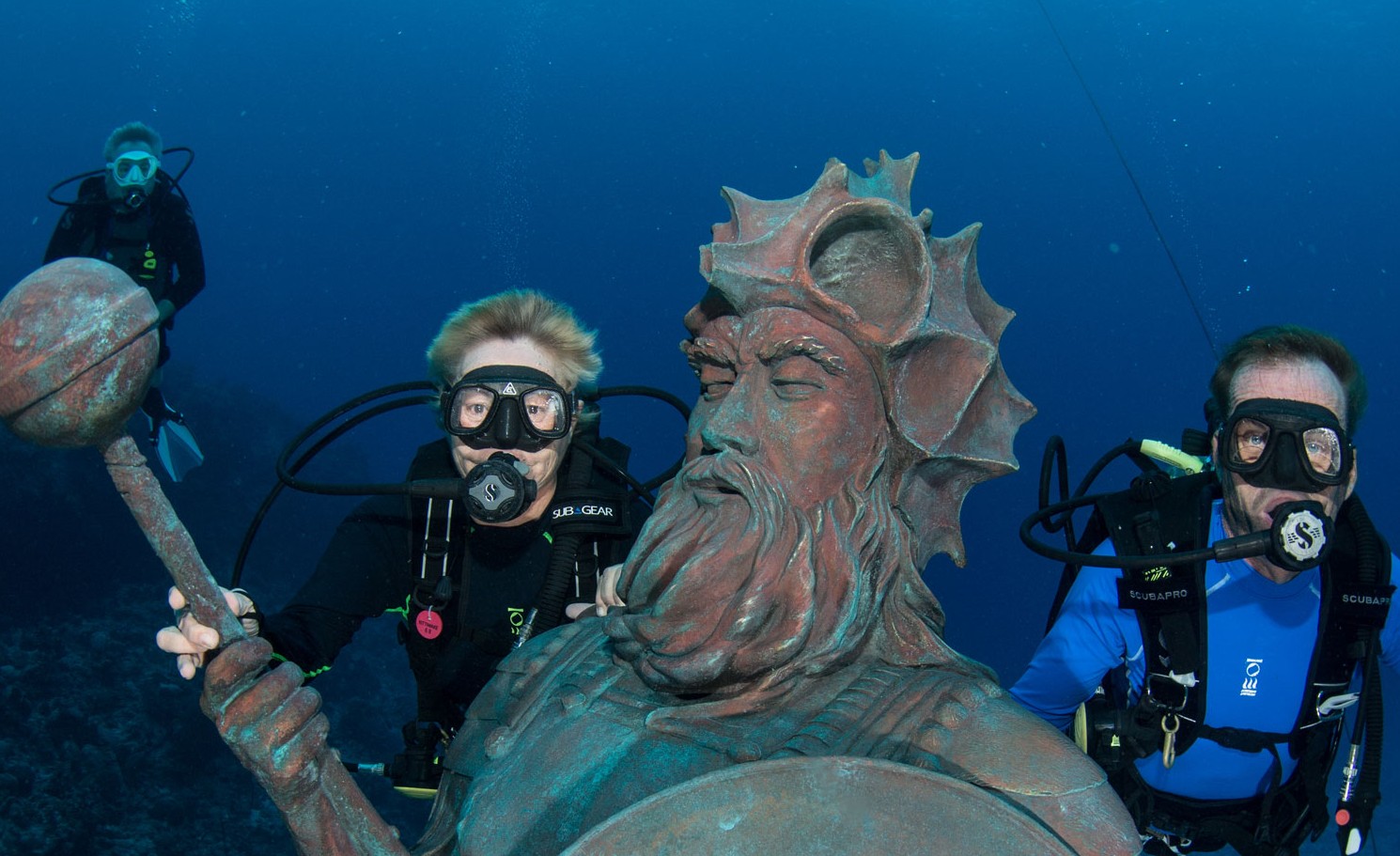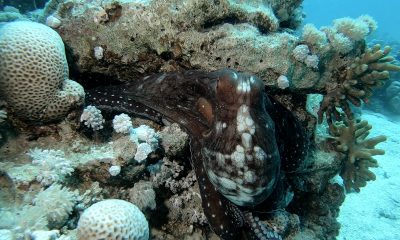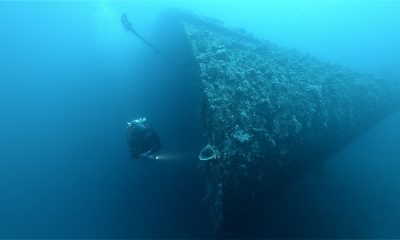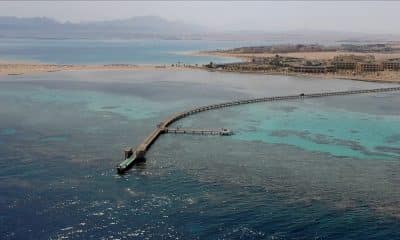Marine Life & Conservation
Divetech’s Guardian of the Reef Making Himself at Home at Northwest Point

Since his celebrated sinking on April 12, more that 750 divers, both visitors and locals, have visited Cayman’s newest dive attraction, the Guardian of the Reef. The bronze sculpture sits on a sandy flat in 60 feet of water just offshore from the Divetech dive shop at Lighthouse Point on Grand Cayman’s Northwest Point, and watches over the reef of this popular dive site.
“Swimming out from shore to see him, it is as if he is greeting you when you arrive in his realm − welcoming you and sort of saying ‘look at the wonders of my realm’,” says Everett Turner, a part-time Lighthouse Point resident and long-time Divetech customer, who was present for the sinking celebrations.
Local underwater cinematographer Frans De Backer recalls his first dive at the site. “As soon as you discover the Guardian in the deep beside the mini-wall at Lighthouse Point, a feeling of mystery overwhelms you. The mystery continues as you approach the 13-foot bronze statue, half Seahorse, half Mythological Warrior and it’s becoming even stronger as you start diving closely around this morphed creature and look him in the eyes. Sculptor Simon Morris created the eyes in a way that wherever you are, the statue is looking at you and keeping an eye on you, like a true Guardian should.”
“Although the guardian was very impressive on land he’s even more magnificent underwater,” says photographer Ellen Cuylaerts, who first met him in Orlando at the Dive Equipment and Manufacturers Association’s (DEMA) annual convention. “The eye contact with him gives you chills in a good way, makes you humble and inspires you to help him with his task to protect and guard the reefs!”
Divetech owners Jay and Nancy Easterbrook purchased the sculpture as part of the company’s 20th anniversary, and they say this is the Guardian’s primary purpose – to inspire ocean conservation. The popularity of the new dive star is good news for the environment because one dollar from every dive made at the site will be used for ocean conservation education in the local schools. The Easterbrooks are hoping to raise $20,000 the first year, and the money will help support the West Bay Eco Warriors after-school swim/dive programme run by Emma Nicholsby and potentially buy classroom material from Annie Crawley, also known as “Ocean Annie” who has created several conservation programs for kids.
“The Guardian is symbolic for the task that we humans have neglected for decades: we have to take care of our reefs and our oceans. Therefore, I think it’s a great idea that a portion of the dive fee is going to conservation education,” remarks Frans De Backer.
“The Guardian of the Reef is a uniquely wonderful and appropriate figure, aptly named for his purpose of promoting awareness of our fragile oceans,” agrees Everett Turner. “To me, he represents a powerful creature who at the same time is also fragile just like the oceans. They are a very powerful force filled with life forms yet those life forms are fragile and we are in danger of losing them if we don’t take action.”
Divetech began offering dive services on Grand Cayman in 1994 and has always been a champion for Cayman’s underwater world. Nancy and Jay Easterbrook say the Guardian of the Reef and this conservation program allows them to give back to the community.
“It’s been 20 wonderful years, wonderful ocean, wonderful people and we wanted to give back to the community. Seeing him out there now with divers enjoying and being inspired by him, it’s more than we expected, more than we could have hoped for” commented Jay Easterbrook.
As the Guardian of the Reef makes himself at home on the reef, his neighbors, the sea creatures that live there, are also getting to know him. Several days after he was placed on the site, divers found a sea horse not too far from the sculpture. Everett Turner, who as an underwater photographer scours the reef there, looks forward to seeing what creatures and fish he attracts.
“He is resting not too far from some of our favourite areas for finding dwarf frog fish, pipe horses and a multitude of other macro creatures,” he says. “I am hoping he might attract some schools of grunts and jacks and some of the other reef fish that are found just around the corner from him.”
Just getting to know the new kid on the block is fun for Divetech customers, as well as staff members.
“It is awesome to drop down and be face to face with the Guardian of the Reef!” says Emma Nicholsby, who frequently free dives the site with friends.
On a night dive Kara Owens was impressed. “It’s almost eerie coming along this huge lone statue in the pitch of night, Goosebumps!”
“The Guardian is the perfect addition to one of Grand Cayman’s best reefs, yet when you see him you get the sense he’s been there a long time, and will be there a long time, watching over the reef,” says Nina Baxa.
About Divetech
Divetech is a IANTD Platinum Facility / TDI/SDI Instructor Trainer Facility / PADI 5-Star Resort / PADI TecRec Facility / PADI Project Aware Center / SSI Resort / IANTD & SSI Free Diving Center / BSAC Resort / National Geographic Center/ Scuba Rangers Club / Universal Training Facility / PADI Swim School / DAN Technical Field Research Station full service dive operator with facilities at Cobalt Coast Dive Resort on the tranquil Northwest shore of Boatswain’s Bay, and Lighthouse Point on Northwest Point Road, both located in West Bay just a few miles north of the hustle and bustle of Seven Mile Beach.
Considered one of Grand Cayman’s leading dive operations, Divetech has been providing quality dive services since 1994, and it has earned a reputation as the place to go in Grand Cayman for quality training from kids to trimix with 18 Instructors on staff. Divetech is Green Globe Certified and is a recipient of the Tripadvisor Certificate of Excellence in 2014 and the PADI Green Star Award. Divetech offers great dive and room packages with its resort partner Cobalt Coast Dive Resort, which has established a reputation for laid back luxury and friendly West Indian hospitality, offering 20 suites and villas, full restaurant and bar, pool and award winning customer service.
For more information
Call: +1 (345) 946-5658
Web: www.divetech.com
Facebook: www.facebook.com/DiveTech
Twitter: www.twitter.com/DiveTech
Marine Life & Conservation
Leading UK-based shark conservation charity, the Shark Trust, is delighted to announce tour operator Diverse Travel as a Corporate Patron

 Corporate Patrons provide a valuable boost to the work of The Shark Trust. The Trust team works globally to safeguard the future of sharks, and their close cousins, the skates and rays, engaging with a global network of scientists, policymakers, conservation professionals, businesses and supporters to further shark conservation.
Corporate Patrons provide a valuable boost to the work of The Shark Trust. The Trust team works globally to safeguard the future of sharks, and their close cousins, the skates and rays, engaging with a global network of scientists, policymakers, conservation professionals, businesses and supporters to further shark conservation.
Specialist tour operator Diverse Travel has operated since 2014 and is committed to offering its guests high quality, sustainable scuba diving holidays worldwide. Working together with the Shark Trust will enable both organisations to widen engagement and encourage divers and snorkellers to actively get involved in shark conservation.
“Sharks are truly at the heart of every diver and at Diverse Travel, we absolutely share that passion. There is nothing like seeing a shark in the wild – it’s a moment that stays with you forever!” says Holly Bredin, Sales & Marketing Manager, Diverse Travel.
“We’re delighted to celebrate our 10th year of business by becoming a Corporate Patron of the Shark Trust. This is an exciting partnership for Diverse and our guests. We will be donating on behalf of every person who books a holiday with us to contribute towards their vital shark conservation initiatives around the world. We will also be working together with the Trust to inspire divers, snorkellers and other travellers to take an active role – at home and abroad – in citizen science projects and other activities.”
Paul Cox, CEO of The Shark Trust, said:
“It’s an exciting partnership and we’re thrilled to be working with Diverse Travel to enable more divers and travellers to get involved with sharks and shark conservation. Sharks face considerable conservation challenges but, through collaboration and collective action, we can secure a brighter future for sharks and their ocean home. This new partnership takes us one more valuable step towards that goal.”
For more information about the Shark Trust visit their website here.
For more about Diverse Travel click here.
Marine Life & Conservation
Shark Trust Asks Divers to help with Shark Sightings this Global Citizen Science Month

 Whether you are stuck for ideas of what to do with the kids or are off on the dive trip of your dreams. You can get involved in Citizen Science Month and help the Shark Trust by providing vital data about sharks are rays both close to home and further afield.
Whether you are stuck for ideas of what to do with the kids or are off on the dive trip of your dreams. You can get involved in Citizen Science Month and help the Shark Trust by providing vital data about sharks are rays both close to home and further afield.
In addition to reporting the sharks and rays you see on your dives, the eggcases you find on the beach, the Shark Trust is looking for some specific data from divers who are asked to report any Oceanic Whitetip and Basking Sharks.
Oceanic Whitetip Sharks
The Shark Trust are looking specifically for Oceanic Whitetip Shark sightings over the coming weeks and months. So, if you are diving anywhere in the world, please report your sightings via the website or app.
Website: https://recording.sharktrust.org/
App: Search The Shark Trust in your app store
The Oceanic Whitetip. Known for their incredibly long dorsal and pectoral fins, this species was once the most abundant oceanic-pelagic species of shark on the planet.
Large and stocky, they are grey or brown above, and white below and famous for their huge rounded first dorsal fin and paddle-like pectoral fins. The fins also highly prized within the shark fin trade. Whilst they are mostly solitary, Oceanic Whitetips do occasionally hunt in groups.
An inquisitive species, they were easy prey for fisheries. Combined with their low reproductive rate, they were inevitably at high risk of population depletion. And declines of up to 99% have been reported in certain sea areas. They are listed as Critically Endangered on the IUCN Redlist (2019).
Conservation efforts to discourage further declines include listing on CITES Appendix II and CMS Appendix I. They’re also the only species prohibited from take by all the Tuna RFMOs (Regional Fisheries Management Organisations). However, these measures do not mean that Oceanic Whitetips are not still caught – whether targeted or as bycatch – in some parts of the world. With populations declining at such a high rate, effective implementation of management measures is essential to ensure that the species can recover.
If you are lucky enough to get an image of an Oceanic Whitetip and you record your sighting on the Shark Trust app or website YOU CAN WIN! All images submitted with sightings, that also give consent to use in conservation messaging, will be in with a chance to win an Oceanic Whitetip T-shirt and mug. The competition will run until the end of “Shark Month” in July – so keep those sightings (and images) coming in.
Basking Sharks
Basking Shark (Cetorhinus maximus) season is upon us, and the Shark Trust is asking everyone to keep an eye out for these majestic giants over the summer months. If you see any, you can record your sighting to the Basking Shark Sightings database.
Each year, these mighty fish return to British waters to feed on plankton. You may see one, (or a few if you’re really lucky) from around April-October. They can be seen feeding at the surface of the water, where they look like they’re basking in the sun. Thus, their name!
Sighting hotspots around the British Isles include southwest England, Isle of Man, north coast of Ireland, and western Scotland. The Sea of the Hebrides is the most prolific sightings area in Scotland, but they have been spotted all around the coast and have even ventured into some of the sea lochs. The Shark Trust has received thousands of sightings since the Basking Shark project began, but more data is needed to truly understand what is going on with population numbers and distribution. You can help by recording your sightings this summer.
Great Eggcase Hunt
The Shark Trust has an Easter Egg Hunt with a difference for you to try. Take part in the Great Eggcase Hunt and get involved with a big citizen science project that helps shark, ray and skate conservation. And it’s an enjoyable activity for all the family.
The Shark Trust also want snorkellers and divers to record their underwater eggcase findings. Underwater records help pinpoint exactly where sharks and skates are laying their eggs and can help link to beach records. Learning the depth and substrate that they lay on also helps better understand the species.
Find out more: https://www.sharktrust.org/great-eggcase-hunt
Whether you are diving, snorkelling or exploring on the beach you can take part in Citizen Science Month and get actively involved in shark and ray conservation. Find out more: www.sharktrust.org
-

 News3 months ago
News3 months agoHone your underwater photography skills with Alphamarine Photography at Red Sea Diving Safari in March
-

 News2 months ago
News2 months agoCapturing Critters in Lembeh Underwater Photography Workshop 2024: Event Roundup
-

 Marine Life & Conservation Blogs2 months ago
Marine Life & Conservation Blogs2 months agoCreature Feature: Swell Sharks
-

 Blogs2 months ago
Blogs2 months agoMurex Resorts: Passport to Paradise!
-

 Blogs2 months ago
Blogs2 months agoDiver Discovering Whale Skeletons Beneath Ice Judged World’s Best Underwater Photograph
-

 Gear News3 months ago
Gear News3 months agoBare X-Mission Drysuit: Ideal for Both Technical and Recreational Divers
-

 Gear Reviews2 months ago
Gear Reviews2 months agoGear Review: Oceanic+ Dive Housing for iPhone
-

 Marine Life & Conservation2 months ago
Marine Life & Conservation2 months agoSave the Manatee Club launches brand new webcams at Silver Springs State Park, Florida





















